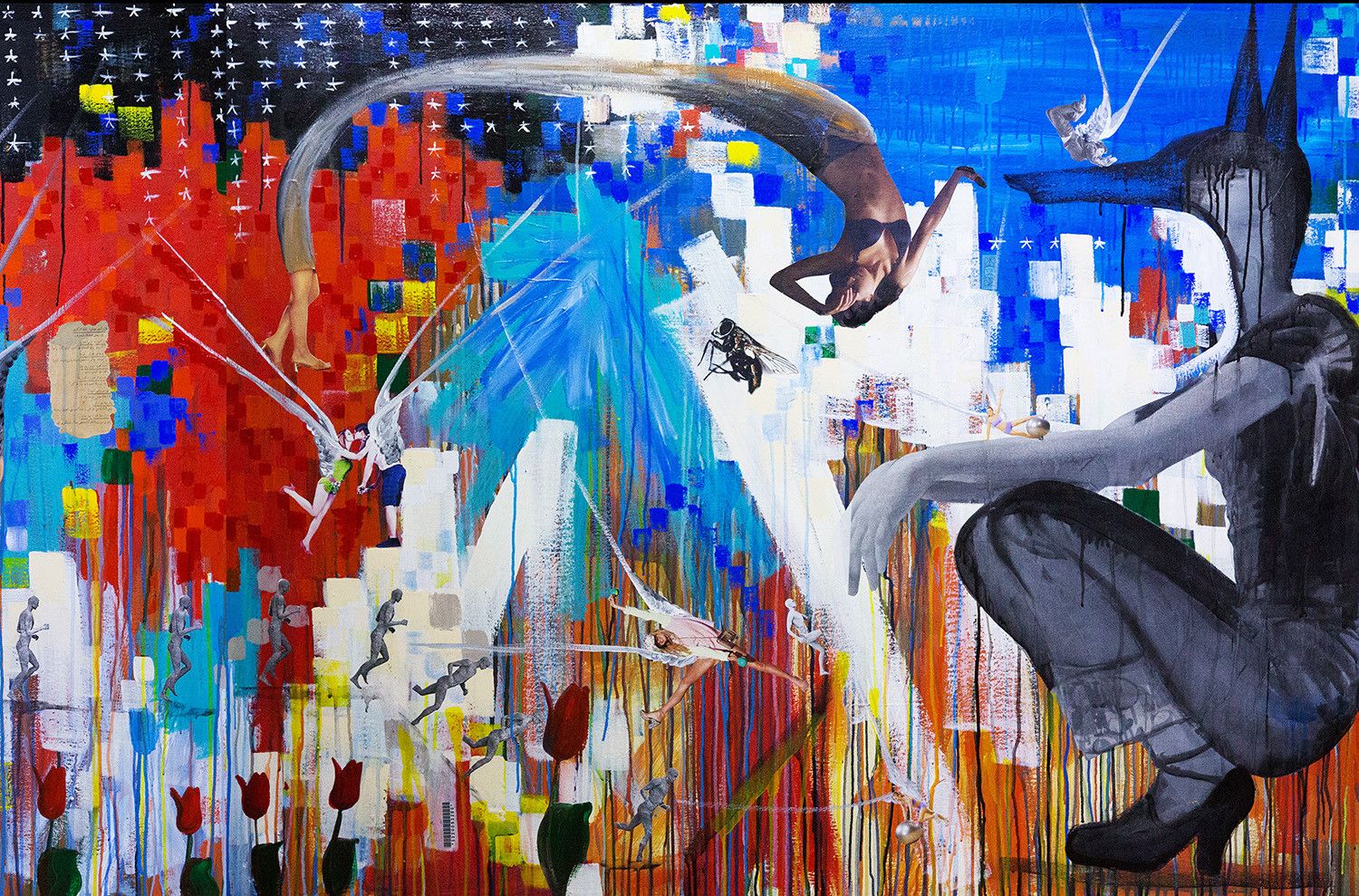The most basic, useful thing to understand about ‘negative emotions’ of all kinds is that there is a part of us that actually wants to indulge in feeling this way. This sounds crazy – after all who wants to feel bad, for heaven’s sake? It goes without saying that no one actually wishes to feel rotten, but the point is that the negative emotion (whether it is self-pity or anger or envy or resentment or whatever) works by offering us an immediate way of feeling better which we are very much tempted to take. Only afterwards, when it is too late, do we see that we have in fact fallen into a hole which it is very difficult to get out of. What is worse is that even when we come out of the mood, we generally go and do the same thing all over again just as soon as the appropriate sort of ‘provocation’ comes along! And if there is one thing that we know for sure, it is that there is always more provocation waiting for us, just round the corner.
We can give an example of the way in which we covertly participate in negative emotions to show exactly how the process works. One such example is used by the author Colin Wilson who asks the reader to think about an everyday sort of a situation where a toddler who is not yet too steady on his feet falls over and hurts himself. At this precise moment there is a fleeting moment of indecision – things could go one way, or they could go another. The most likely possibility is that the child will burst into tears, but if an adult in the room looks at the child and encourages him by saying “What a brave boy, you aren’t crying even a little bit” then the child will shrug off the accident as being no big deal rather than going down the road of feeling sorry for himself. Without such encouragement, as we have said, it is almost certain that it will all end in tears. The point here is that it is us who decides whether we will go down the one road or the other, even though we do not usually experience ourselves as having any choice in this process.
As we have indicated, this ‘fleeting moment of choice’ occurs with all negative emotional states such as self-pity, sulking, anger, jealousy and anxiety but it is not easy for us to believe that such a thing exists because the process is so fast and so automatic. In addition to the apparent lack of experiential evidence for this idea, there is also the problem that we do not like to see things this way because it makes us responsible for what we are going through so that we cannot blame another person, or some external factor that is outside of our control. On the other hand, if it is me who is responsible for my own mental state, then this could also be seen as good news because if I choose it, then that means that I can equally not choose it!
Going For The Bait
What is going on in all these cases (whether I fly into a rage, get eaten up with jealousy, go into a panic-attack, or slip headlong into a morass of self-pity) is that I make a super-fast decision to go for the bait, just like a hungry fish that decides to take a bite at a juicy-looking worm on a hook. There is something tasty and tempting dangling there in front of my nose, and without really thinking about it I just go for it. Like the fish, however, I discover that the anticipated moment of satisfaction quickly gives way to the realisation that I am snagged on a hook, but by then of course it is too late to do anything about it. In the case of the fish it is easy enough to see what the ‘lure’ was, but what is the lure for anger, jealousy, anxiety or self-pity? Well, the best way to explain it is to say that the lure is an anticipated relief from the discomfort or pain that we are in. I am feeling very bad and each of these emotional reactions offers me (in its own way) a quick exit.
Self-Pity
With self-pity, for example, the lure is a comfortable feeling of being ‘hard done by’ which initially seems like an escape from the pain that we are going through. This is not at all logical, but nevertheless it makes sense from a subjective point of view because what I am (in effect) saying, “I don’t deserve this pain”. The fault lies with the unfairness of the universe and I am merely the blameless victim.
Now the fact is of course that it doesn’t matter a damn whether I deserve it or not because a higher power isn’t suddenly going to come to my rescue and take the pain away from me. No cosmic apology is going to be issued! Nevertheless, the subjective ‘assumed implication’ is that there is some sort of objective standard of justice or fairness that exists out there and which is going to come to vindicate me, and it is on the basis of this unexamined but superficially-plausible assumption that I start to feel better when I first venture into the realm of self-pity.
Needless to say this rewarding feeling does not last and very quickly I find myself in a futile, ‘dead-end’ state of mind that I simply can’t snap out of. I am stuck in a rigid and claustrophobic mental posture of saying “This shouldn’t have happened” when the fact of the matter is that it DID happen. Basically, I am going around in circles: first I complain to myself about the injustice of it all, which is the positive phase because I seem to be onto a winner (in a subjective and unexamined sort of a way), and then comes the negative phase in which I can’t help seeing that my ‘complaining’ is both utterly futile and hideously repetitive, and really not at all conducive to a wholesome or balanced state of mind. I keep on coming back to where I started, only I have to put up with the absolute unremitting misery of my own complaining thoughts the whole time. All I am really doing is convincing myself how terrible things are, which isn’t really doing me any favours at all!
Anger
Anger is not a million miles away from self-pity because the basic feeling is still ‘this should not be happening to me’. Something has happened that is causing me difficulty, and I very strongly feel that I do not deserve this difficulty. What is more, I have a very keen perception of how wrong (or how ‘culpable’) the person is to have done this to me. Or perhaps it is not a specific person, but the world in general that has done me wrong. This thought is like a red rag to a bull, and as soon as I focus on the ‘wrongness’ of it all the bull charges, and I am locked into an angry reaction. The initial thought that an injustice has occurred and that someone else is responsible is very attractive, but as soon as I focus on this I am forced by the logic of my thinking down a very narrow passage – this black-and-white logic compels me to strike out in some way (either physically or verbally, or very often simply by ‘thinking angry thoughts to myself in the privacy of my own mind’). At first this ‘lashing out’ gives me some relief and satisfaction, but the satisfaction I get is only a very momentary and it gives way almost immediate to a thoroughly rotten feeling in myself that generally stays with me for a long, long time. My anger is actually poisoning me, and causing me to feel worse than ever.
In anger (as in the other afflictive emotions) what happens is that I succumb to the temptation to see the world in an oversimplified, black-and-white way, in order that I might feel justified or validated in some way. In the case of anger, my viewpoint is telling me that “I am totally in the right and you are totally in the wrong”. The problem with this is that after the initial feeling of satisfaction is over, I am still stuck in that narrow, oversimplified way of seeing the world and there is no way that any genuine happiness or peace of mind can come out of such an angry, distorted frame of thinking. All this mind-frame is good for is continually justifying itself! I am trapped in a position therefore where all I can do is continually reiterate the anger in order that I might get a momentary feeling of relief and vindication.
Jealousy
In the case of jealousy I am being continually tormented by the thought that the prize which ought to mine is in fact being enjoyed by someone else. The ‘lure’ in jealousy is therefore the horrible fascination of the thought that someone else (who might be real or imaginary) is getting what I should be getting! For the egoic self this is of course the most unfair thing ever! Nothing stings like this! The thought that ‘someone else is getting what I should be getting’ does not sound very attractive, but it is attractive precisely because we are so very much against the idea! The essential thought-process in jealousy takes it absolutely for granted that I should be the ‘enjoyer’ (or ‘possessor’) of the person I am feeling jealousy towards and this automatic assumption is the self-validating element in the thinking, which is the same as me thinking ‘This shouldn’t have happened to me” when I am self-pitying, or thinking “They were at fault to have done that to me” when I am angry. This ‘element of self-validation’ is in this way the lure that draws me into the trap of the negative emotion. As soon as I fall into the assumption of thinking that I should be the enjoyer (or possessor) of the person I am jealous towards I am simultaneously tormented because my very strong suspicion is that I am not!
Envy
Similarly, in the case of envy the lure is the thought that “I should be the one who has that prize…” (the prize in question being whatever it is that I am envious about). Dwelling on the fact that someone else possesses this prize and I don’t possess it is not (needless to say) going to make me feel particularly good, but as is the case with jealousy I am hypnotized by the ‘negative attractiveness’ of thinking that someone else has something that I would very much like to have.
Just as in self-pity I keep myself in the trap by continually ‘consoling’ myself by re-iterating to myself the unfairness of the situation that I am in, in envy I am – we could say – consoling myself by re-iterating to myself that I ought to be the possessor of the prize and not someone else. In this way I am constantly reconfirming the validity of my position, which feels good, but the almost instantaneous back-lash of this self-comforting or self-validating is the acutely painful awareness that in fact I am most definitely NOT the possessor, despite the fact that I feel very strongly that I would like to be….
Anxiety
The way in which anxiety works is similar in a way to envy, even though it isn’t really an emotion. This is because the ‘lure’ in question arises out of a negative fascination, which is to say, a fascination with a state of affairs which we find particularly unwelcome! In anxiety what happens is that my mind suddenly identifies a possibility of how things may go wrong and I get fixated on this. What sticks me to the possibility in question is my belief that it must not on any account be allowed to happen, because of the way in which it threatens the integrity of the egoic self. This too is an example of the ‘back-lash’ principle, therefore – the ‘self-validating element’ has to do with the automatic and unquestionable assumption that the integrity of the egoic self is so very important that it has to be safeguarded at all costs, and ‘the back-lash’ of this assumption is the thought that something might conceivably happen which will prove a risk to this very important requirement that the ego-self must always be safe. The absolute requirement or need that “I must be safe” is the very same thing as anxiety, therefore…
I cannot just leave the possibility of ‘unsafeness’ alone, so to speak – I am stuck there with it and my only escape seems to be if I can figure out a way of ‘solving’ the problem. Therefore, the ‘comfort zone’ that I move into is ‘the comfort zone of trying to find a way around the difficulty, a way of fixing the problem’. The compulsive mental activity of ‘me trying to fix the problem’ offers me some sort of immediate relief from the fear that I am experiencing, but it is ‘futile’ mental activity all the same because I can never be totally sure that I have it under control (and most of the time I don’t even feel a little bit sure). The short-lived positive phase of the anxiety cycle is therefore the ‘positive anticipation’ that I can solve the problem, and the negative phase is ‘negative anticipation’ which is where I experience renewed fear, and despair regarding my chances of being able to do so.
The ‘lure’ which attracts my attention in anxiety is the horrifying glimpse of some way in which things are threatening to go wrong, and the ‘bite’ is me reacting to this mental picture by frantically trying to calculate or plan some sort of escape from that feared possibility. Once I do react then I am caught because the logic of my thinking compels me to ‘continuously keep on trying to work out a solution’ and continually trying to work out a solution when there is none is what anxiety is all about. By allowing myself to keep on hoping for a solution to the problem of ‘eliminating all risk in life – which is needless to say an absolutely insoluble problem – I put myself in line for the torment of a continuous ‘negative rebound’.
Not Taking The Bait
So far we have looked at many examples of the same basic principle: we go for the bait, and we get caught on the hook. It is as simple as that. But how do we avoid endlessly repeating this unfortunate behaviour pattern? Well, knowing about the process of getting snared in negative emotions is a step in the right direction: if I know that there is a hook hidden in the bait then maybe I won’t be so keen to ‘go for it’. Maybe I won’t ‘bite’! The trouble is however that I can’t seem to help biting. It all happens so quickly that before I know it, it is too late and I’ve ‘gone and done it’. Basically, the process is fully automated – the part of me that wants to get sucked into a negative emotion is an automatic part. It’s a mechanism. It’s a habit that just happens by itself while I watch helplessly on.
There is a way to undo this habit though, and that is by becoming more and more observant, more and more sensitive, and more and more wise to what is actually going on. If I am willing to keep on paying attention to my mental processes, and if I can find it within myself to have patience with myself as I keep tripping up time and time again and getting snared by the trap, then the day will inevitably come when a ‘provocation’ arrives on my doorstep, and I simply don’t react.
Negative Capability
When this happens, it is of course a moment of very profound freedom. Not doing something may not seem to most people like a big deal, but when we find out through personal experience how hard it is to ‘not react’, we will appreciate that ‘not doing’ is the secret to everything. After all, if the only reason that I react is because I can’t not react (i.e. because I have no real choice in the matter) then all my so-called ‘doing’ comes down to lack of freedom. Basically, I am a slave to my ‘mechanical pattern of reacting’ and when I get into a difficult or painful situation, what I do in this situation is simply what I always do, and ‘what I always do’ is not at all helpful. For this reason it can be seen that freedom is to be found in not-reacting even though this sounds like a purely ‘negative capability’.
When it comes down to it, the negative capability of ‘being sensitive to what is going on without having to react to it’ is infinitely more useful to us than anything else we might learn. In fact ‘negative capability’ is the only thing we need to learn in order to be free from the type of pain-producing negative emotions that control us so very frequently. It is therefore not what we deliberately do that will free us (since ‘deliberate doing’ is just another way of talking about automatic or mechanical reacting) but what we don’t do…






